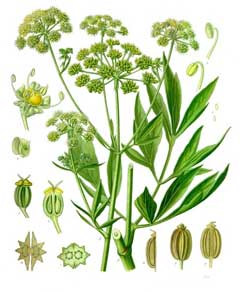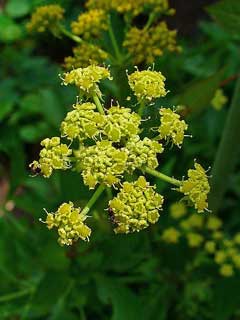 |
|
http://commons.wikimedia.org/wiki/File:Koeh-217.jpg |
 |
| http://commons.wikimedia.org/wiki/User:Llez |
Translate this page:
Summary
Bloom Color: Green, Yellow. Main Bloom Time: Early summer, Late spring. Form: Upright or erect.
Physical Characteristics

 Levisticum is a PERENNIAL growing to 1.8 m (6ft) by 1 m (3ft 3in) at a medium rate.
Levisticum is a PERENNIAL growing to 1.8 m (6ft) by 1 m (3ft 3in) at a medium rate.
See above for USDA hardiness. It is hardy to UK zone 4 and is not frost tender. It is in leaf from March to November, in flower from July to August, and the seeds ripen from August to September. The species is hermaphrodite (has both male and female organs) and is pollinated by Insects. The plant is self-fertile.
It is noted for attracting wildlife.
Suitable for: light (sandy), medium (loamy) and heavy (clay) soils. Suitable pH: mildly acid, neutral and basic (mildly alkaline) soils. It can grow in semi-shade (light woodland) or no shade. It prefers moist soil.
UK Hardiness Map
US Hardiness Map
Synonyms
Hipposelinum levisticum. Levisticum levesticum. Ligusticum levisticum. Selinum levisticum.
Plant Habitats
Edible Uses
Leaves and stems - raw or cooked[2, 4, 14, 21]. Used as a savoury flavouring in salads, soups, stews etc, imparting a yeasty/celery flavour[9, 52]. The leaves can be used fresh or dried and are available from late winter until late autumn. To ensure a good supply of the leaves in the summer, it is best to cut the plants down to the ground when flowering in the summer[K]. The young stem can be blanched and used like celery in salads or as a savoury flavouring in cooked foods[52, 183]. Seed - raw or cooked. A strong yeasty flavour, it is used as a flavouring in cakes, soups, salads etc[2, 21, 46, 200]. It can be used whole or ground into a powder. Root - cooked. A strong savoury taste, it can be used as a flavouring[142] or cooked as a vegetable[200]. It is best grated[200]. Best used when 2 - 3 years old[142]. Flowers[183]. No more details are given. A tea is made from the dried leaves. A strong savoury flavour, it tastes more like a broth[21, 183]. A tea can also be made from the grated roots[183]. An essential oil from the root is used commercially as a food flavouring[183, 238]. Yields of 0.5% are obtained[7].
References More on Edible Uses
Medicinal Uses
Plants For A Future can not take any responsibility for any adverse effects from the use of plants. Always seek advice from a professional before using a plant medicinally.
Lovage is a warming and tonic herb for the digestive and respiratory systems. It is used primarily in the treatment of indigestion, poor appetite, wind, colic and bronchitis[254]. The roots, leaves and fruits are antispasmodic, aromatic, carminative, diaphoretic, digestive, diuretic, mildly expectorant and stimulant[4, 7, 21, 46, 165, 238]. They are used internally in the treatment of disordered stomachs, especially cases of colic and flatulence in children, kidney stones, cystitis, painful menstruation and slow labour[4, 238]. Externally, the root is used in the treatment of sore throats and aphthous ulcers[238]. The roots of plants 3 years old can be harvested in early spring or in the autumn and are used fresh or dried[9, 238]. The leaves are harvested before the plant comes into flower and either distilled for their oil or dried for later use[238]. The leaves, either eaten in salads or dried and infused as a tea, have been used as an emmenagogue[4]. The essential oil from the seeds is used by aromatherapists to remove freckles and spots from the face[244]. The German Commission E Monographs, a therapeutic guide to herbal medicine, approve Levisticum officinale - Lovage for infections of the urinary tract, kidney and bladder stones (see [302] for critics of commission E).
References More on Medicinal Uses
The Bookshop: Edible Plant Books
Our Latest books on Perennial Plants For Food Forests and Permaculture Gardens in paperback or digital formats.

Edible Tropical Plants
Food Forest Plants for Hotter Conditions: 250+ Plants For Tropical Food Forests & Permaculture Gardens.
More

Edible Temperate Plants
Plants for Your Food Forest: 500 Plants for Temperate Food Forests & Permaculture Gardens.
More

More Books
PFAF have eight books available in paperback and digital formats. Browse the shop for more information.
Shop Now
Other Uses
An essential oil from the plant is used in perfumery[7, 238].
Special Uses
References More on Other Uses
Cultivation details
Landscape Uses:Border, Container, Foundation. An easily grown plant, it prefers a rich moist but well-drained soil in a sunny position[4, 52], though it tolerates some shade[14]. Lovage has very aromatic leaves. It is often grown in the herb garden as a culinary herb[7] and is occasionally grown commercially as a food flavouring[K]. If the plant is cut back to the ground during the growing season it will produce a new flush of young leaves[200]. If the weather is dry at this time, it will be necessary to water the plants in order to encourage fresh growth[K]. Lovage is a good companion plant, improving the health and flavour of other plants growing nearby[14, 20]. The flowers are very attractive to bees and also draw insect predators such as hoverflies into the garden[24]. Special Features:
Edible, Fragrant foliage, Not North American native, Naturalizing. For polyculture design as well as the above-ground architecture (form - tree, shrub etc. and size shown above) information on the habit and root pattern is also useful and given here if available. The plant growth habit is a clumper with limited spread [1-2]. The root pattern is rhizomatous with underground stems sending roots and shoots along their length [1-2].
References Carbon Farming Information and Carbon Sequestration Information
Temperature Converter
Type a value in the Celsius field to convert the value to Fahrenheit:
Fahrenheit:
The PFAF Bookshop
Plants For A Future have a number of books available in paperback and digital form. Book titles include Edible Plants, Edible Perennials, Edible Trees,Edible Shrubs, Woodland Gardening, and Temperate Food Forest Plants. Our new book is Food Forest Plants For Hotter Conditions (Tropical and Sub-Tropical).
Shop Now
Plant Propagation
Seed - sow spring or early autumn in a cold frame. The seed can be slow to germinate so it is probably best sown as soon as it is ripe[K]. Prick out the seedlings into individual pots when they are large enough to handle and plant them out into their permanent positions in the summer. Division in spring or autumn. This can be quite hard work due to the size of the roots but the plant grows away very well afterwards. Larger clumps can be replanted direct into their permanent positions, though it is best to pot up smaller clumps and grow them on in a cold frame until they are rooting well. Plant them out in the spring.
Other Names
If available other names are mentioned here
Native Range
TEMPERATE ASIA: Iran,Afghanistan.
Weed Potential
Right plant wrong place. We are currently updating this section.
Please note that a plant may be invasive in one area but may not in your area so it’s worth checking.
Conservation Status
IUCN Red List of Threatened Plants Status :

Growth: S = slow M = medium F = fast. Soil: L = light (sandy) M = medium H = heavy (clay). pH: A = acid N = neutral B = basic (alkaline). Shade: F = full shade S = semi-shade N = no shade. Moisture: D = dry M = Moist We = wet Wa = water.
Expert comment
Author
W.D.J.Koch.
Botanical References
200
Links / References
For a list of references used on this page please go here
Readers comment
| Add a comment |
|
If you have important information about this plant that may help other users please add a comment or link below. Only comments or links that are felt to be directly relevant to a plant will be included. If you think a comment/link or information contained on this page is inaccurate or misleading we would welcome your feedback at [email protected]. If you have questions about a plant please use the Forum on this website as we do not have the resources to answer questions ourselves.
* Please note: the comments by website users are not necessarily those held by PFAF and may give misleading or inaccurate information.
To leave a comment please Register or login here All comments need to be approved so will not appear immediately.
|
|